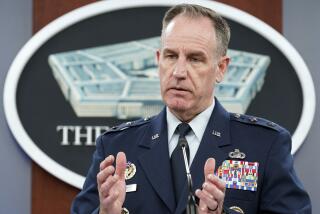Bush Defense Costs Not Understated, Panel Says : Budget: Some Democrats have contended a large ‘error’ would require deeper Pentagon cuts. Report lays to rest a major issue in debate.
WASHINGTON — The Clinton Administration conceded Monday that the George Bush Administration did not massively understate the cost of continuing U.S. military programs over the next three years, as some Democratic critics have contended.
After a 90-day investigation by an independent panel, the Defense Department reported that any actual “error” most likely will total $12 billion to $15 billion for the three years, rather than $50 billion to $75 billion, as some critics had charged.
As a result, Clinton Administration officials said they will not have to cut major defense programs further in order to make up the difference. “It’s . . . not as bad as some of the projections,” a Pentagon budget expert said during a briefing for reporters.
The report laid to rest what had threatened to become a major issue in this year’s defense debate. Several key lawmakers, including Sen. Sam Nunn (D-Ga.), chairman of the Senate Armed Services Committee, warned that the disparity could derail the entire defense budget.
Defense Secretary Les Aspin had appointed the Defense Science Board Task Force in February and asked it to review the charges involving the Bush Administration’s budget estimates.
The issues involved three technical but potentially costly anomalies:
* The defense budget submitted by the previous Administration had listed $70-billion worth of savings from management “reforms” that it ordered in key defense programs over the next three years. Critics charged that Bush had overstated these savings by as much as $50 billion.
* Several key weapons systems now being developed will come into actual production over the next few years, creating a surge in spending that cannot be easily averted. Democrats contended that the Bush Pentagon failed to allow enough to cover the increase.
* The Bush Administration had estimated that the cost of environmental cleanup for military installations and discarded bases would gradually decline over the next several years, but critics contended that it would mushroom, leaving the defense budget in a squeeze.
The panel, headed by Philip A. Odeen, a former Defense Department official, said all three fears had been exaggerated. Although some programs were proving more costly than expected, the excess was not nearly as large as some critics feared, it said.
The likely error regarding savings from management reforms was estimated at $9 billion to $11 billion, the panel said. Underestimates regarding weapons costs are $2 billion to $3 billion, while extra costs of environmental cleanup run between $1 billion and $1.5 billion, it said.
The Clinton Administration already had anticipated the bulk of the disparity, cutting an extra $10 billion from other portions of the fiscal 1994 defense budget that it submitted in March.
But officials said Aspin opposed further cuts out of concern they would damage military readiness. As a result, the Administration will increase its military budget by $5 billion a year between now and fiscal 1997 to cover the extra costs.
Despite all the budget juggling, officials conceded that the impact of Monday’s action may be overtaken by the sweeping “bottom-up review” of the defense budget that Aspin has begun in an attempt to reshape the armed forces for the post-Cold War world.
Defense officials say that review, which is scheduled to be completed this summer, could bring major changes in nearly all areas of the military budget.
In addition to the other issues, the Odeen panel also recommended that the Administration and Congress begin mapping out defense budgets for several years at a time to provide for “more rational” planning.
More to Read
Get the L.A. Times Politics newsletter
Deeply reported insights into legislation, politics and policy from Sacramento, Washington and beyond. In your inbox three times per week.
You may occasionally receive promotional content from the Los Angeles Times.










